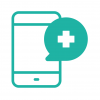Osakidetza, Basque Health Services, has invested heavily in the last years in digitalization and e-Health. It's digital transformation supports the use ofICTs in the health service, as a key enabler to provide an integrated and person-centred care model, promote value of care, better quality, more accessible and safer. The implementation of digital tools has boost to facilitate healthcare integration, collaboration between professionals and citizen empowerment through digital tools and solutions.
The Personal Health Folder(PHF), launched in 2013, allows citizen’s secure access to their health data or records, and enable communication with professionals. Citizen can enrich their PHF through self-tracking programs or uploading documents. The Personal Health Folder services can be grouped into 4 blocks:
- Consult and retrieve information: Filiation data the basic data of the patient is shown together with the health professional assigned to him/her; my clinical history that includes discharge reports, primary care reports, laboratory reports, radiological tests and surgical reports; upcoming appointments; and surgical waiting list.
- Enrich the medical history: by self-tracking programmes, and uploading of documents by the patient himself/herself.
- Interaction with the health system: Patient diary where can be recorded his or her state of health at the request of the healthcare professionals, and this information is automatically included in his or her own medical record; professional can send a messages to the patient; and doubts with your doctor a two-way non-presential care channel, that is, there is an interrelationship between the patient and the professional himself.
- Allow third parties access to the Health Folder: Parents, Legal Guardians and Authorised Persons.
In 2020 the number of accesses to the Health Folder was 1,310,857 a 50% increase over the previous year, 2019. Basque women access the Personal Health Folder more than men, and regular users are middle-aged, 40 to 60 years old followed by those over 60 years of age.
- Logga in för att kommentera
- Taggar
- IN4AHA digital health literacy digital skills and health personal data digital health skills advanced digital skills

